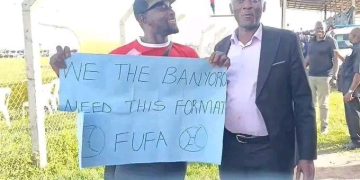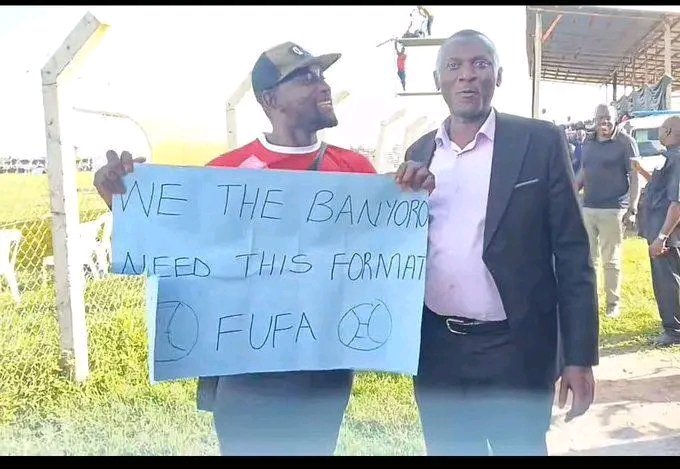The Federation of Uganda Football Associations (FUFA) has suspended the new StarTimes Uganda Premier League format following mounting pressure from clubs and fans.
FUFA President Moses Magogo confirmed the suspension on Saturday after an emergency meeting at the FUFA Complex in Mengo attended by officials from the Uganda Premier League Secretariat and representatives of eleven of the sixteen top-flight clubs.
How the crisis began
FUFA unveiled a three-phase reform package in August, with a single-leg opening round, a midseason split into top eight and bottom eight groups, and a final phase to decide placings.
The package bundled fixture changes with new rules on player registration, match data and prize money. Clubs received full circulars shortly before the planned late September league kickoff.
Early pushback
Club leaders and fan groups warned FUFA the timetable moved too fast. A consultative meeting in early September failed to produce consensus.
The fan and club opposition fell to deaf ears. The 2025/26 UPL season kicked off on Friday, September 26 as planned.
Fans organised boycotts and attendance fell sharply at several fixtures, signalling a commercial risk for clubs, sponsors and broadcasters.
Vipers’ stance and its ripple effects
Vipers SC refused to honour their scheduled fixture against Kitara FC at Namboole. The club cited a poorly handled reform rollout.
The no-show turned a simmering row into a national story and gave momentum to fan protests. FUFA faced a credibility crisis as a major club and it’s supporters rallied behind the boycott.
Lawrence Mulindwa’s role
Vipers president Dr Lawrence Mulindwa led the pressure campaign. He framed the fight as defence of club rights and sporting integrity.
His stance won public sympathy and shifted bargaining power toward clubs.
The general football fraternity credited Mulindwa for turning a single club protest into collective leverage over FUFA.
Notably, SC Villa president Omar Mandela also strongly opposed the new reforms. The club resolved to play under protest.
Split within the clubs
Not every chairman opposed the reforms though. Some decided to keep quiet and play under the new league format. Others shamelessly voiced public support for the format.
Kitara president Deo Kasozi offered a blunt assessment in September, saying, “Yes, Vipers and Villa have big fan bases, but football does not stop because one or two teams are absent. The disadvantages would weigh more heavily on them than on the 13 clubs that remain.”
His statements only added salt to injury and exposed the disunity among club leaders.
Public backlash against pro-reform leaders
Kasozi’s comments and other pro-reform positions also drew sharp criticism from fans and rival chairmen.
Media and social channels ridiculed club officials who appeared out of step with supporters. Reports circulated of leaders facing public embarrassment after backing a package fans openly rejected.
Empty Stadia
One thing that stood out was the fans uniting in opposing the new league format. The three turbulent matchdays were marked by fan boycotts and very poor stadium attendance.
Across the country, supporters staged protests by staying away from games to express their discontent with the new league structure, which they viewed as rushed and unnecessary.
Notably, in a desperate attempt to fill empty stands, KCCA FC reportedly mobilised its own employees to attend matches and handed them club jerseys to pose as fans, a move that drew widespread criticism on social media.
Why FUFA backed down
The federation faced three main converging pressures. First, a sharp fall in matchday attendance threatened club revenues.
Second, a major club refused to play, creating fixture chaos. Third, sponsors and broadcasters warned of brand damage.
In turn, FUFA had to let their egos down. They had no choice but to reluctantly suspend application of Rule 14:4-12 from the 2025 competition rules and to restore the traditional calendar while it pursues more consultations.
What comes next
FUFA promises a programme of education and wider consultation before any fresh format returns to the table. Clubs will push for guarantees on process and timelines.
You should expect formal communiqués from FUFA and the UPL board as they publish a roadmap for the season and for renewed talks.
A final note for fans
Your voice mattered in this dispute. Empty seats sent the clearest message. FUFA agreed to step back from an experiment that lacked broad buy-in.





























